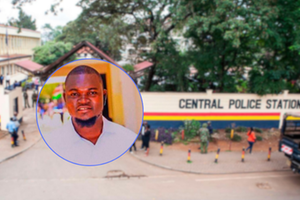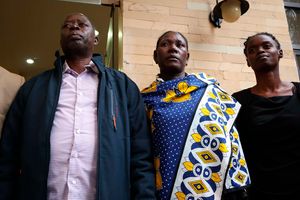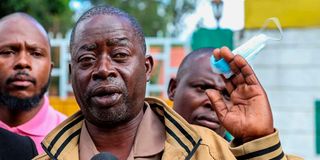
Meshack Ojwang, father of Albert Ojwang, speaks to journalists outside Nairobi Funeral Home on June 8, 2025.
It is Father’s Day, but Albert Ojwang’s father sits in silence, not because he wants to, but because the one person who made this day feel special is no longer alive to mark it with him. He looks at his phone instinctively, not with hope anymore, but with that slow, hollow ache of someone who’s lost the rhythm of something familiar. There’s no message this year.
No heartfelt text from his only son. No mobile money with the usual cheerful note: “Buy yourself something nice, Dad.” Nothing. The phone remains still, and so does he. Heavy in the heart, lost in the abyss, staring at a world that has swallowed his child without an explanation. “He used to wake me up with those messages,” he tells me, “Every single Father’s Day. He remembered me. Celebrated me. He was a son I was proud of.”
His voice trembles, but his words are deliberate, like each one is being pulled up from a place of great pain. This is not just the sorrow of a man who has lost a child. This is the sorrow of a father who knows his son died in the hands of the very people who were supposed to protect him. “He was in police custody,” he says again and again. “Booked at Central Police Station. How does a son die there, and no one tells you what happened? What did he do? What did my son do?”
It’s the question that keeps echoing, both in his mind and across the country. Kenya watched him weep on national television - the image of a father holding a framed photo, asking the world to help him understand why his son had to die. A grown man sobbing uncontrollably, his shoulders shaking, his eyes red and swollen. As Africans, we are taught that fathers do not cry.
That manhood is about strength and control. But what strength is left in a man who must bury the child he once carried on his back? What composure can exist in the heart of a father who will never again hear his son call him “Dad”?
Albert was not a criminal. He was not armed. He was not dangerous. He was part of a generation that has dared to speak, to question power, to demand accountability, to show up when it matters. For that, he was arrested. And for reasons yet to be explained, he never walked out of that police station alive. The state has offered nothing close to the truth.
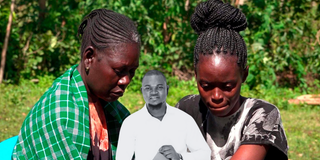
Albert Ojwang, a teacher from Homa Bay, made a haunting call to his wife from police custody in Nairobi, expressing fear and seeking reassurance from his father shortly before his death.
The police narrative changes every few days. The silence is deafening, and the grief is amplified by a country that moves too quickly, a system that kills and forgets. But this family cannot forget. They are left with his body, lying cold in a mortuary, while officers mock the dead and play with versions of the truth.
Still, in this darkness, strangers have appeared. “I may have lost my only son,” Albert’s father says, “but I’ve found my children here.” In a city far from home, in unfamiliar streets, it is young people, some of who only knew Albert from social media who have stepped in to comfort him, to stand beside him, to carry his pain when it became too heavy to bear alone. There is no replacement for a son. But there is something healing about knowing you are not alone in your mourning.
And Albert’s absence is felt not just by his father, but by the woman who loved him deeply and the little boy who still doesn’t understand why his dad hasn’t come home.
“I feel sad that my son won’t get to celebrate Father’s Day with his father,” his wife says. “We had made plans for this day. We wanted to take him out, to honour the kind of father he was becoming.” Her words are full of quiet heartbreak, the kind that sits at the bottom of the chest and never leaves. “Even though our son is still young, he understood that presence. Albert was there. He was loving and protective. He made sure we were okay. He provided, he played, he laughed with our child. He was the kind of father every child deserves.”
Their son, still too little to speak in full sentences, looks at the door now and then, as if expecting someone. Sometimes, she catches him waiting. And she knows one day she will have to sit him down and tell him the truth. “When he’s old enough, I will hold him tight and tell him what happened to his father,” she says. “That he loved him. He cherished every moment with him. That he didn’t just disappear, he was taken. And he didn’t deserve to be taken.”
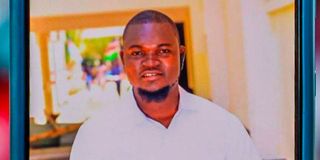
A photo of Voi-based teacher and blogger Albert Ojwang, who died while in police custody.
There is something profoundly cruel about a country where a man is more likely to be killed by the police than by a criminal. Albert’s death is not an isolated tragedy. It is part of a larger pattern of state violence that has left countless families broken, and too many names buried with no justice. And the worst part? Dead people tell no tales. The state is counting on that. On silence. On time to pass. On families to move on. But this one won’t. Because Albert wasn’t just a number. He was a father. A son. A husband. A human being.
This Father’s Day, Albert’s family is not celebrating. They are mourning the man who should be here, sending messages, sharing laughter, and holding his child. They are mourning a future that was violently cut short. But they are also holding onto each other, and to a community that refuses to let this story be buried with him.
“What did my son do?” his father still asks.
Maybe one day we’ll get an answer. Until then, we carry his name. We remember his love. We protect his child. And we promise that Albert Ojwang will not be forgotten.


